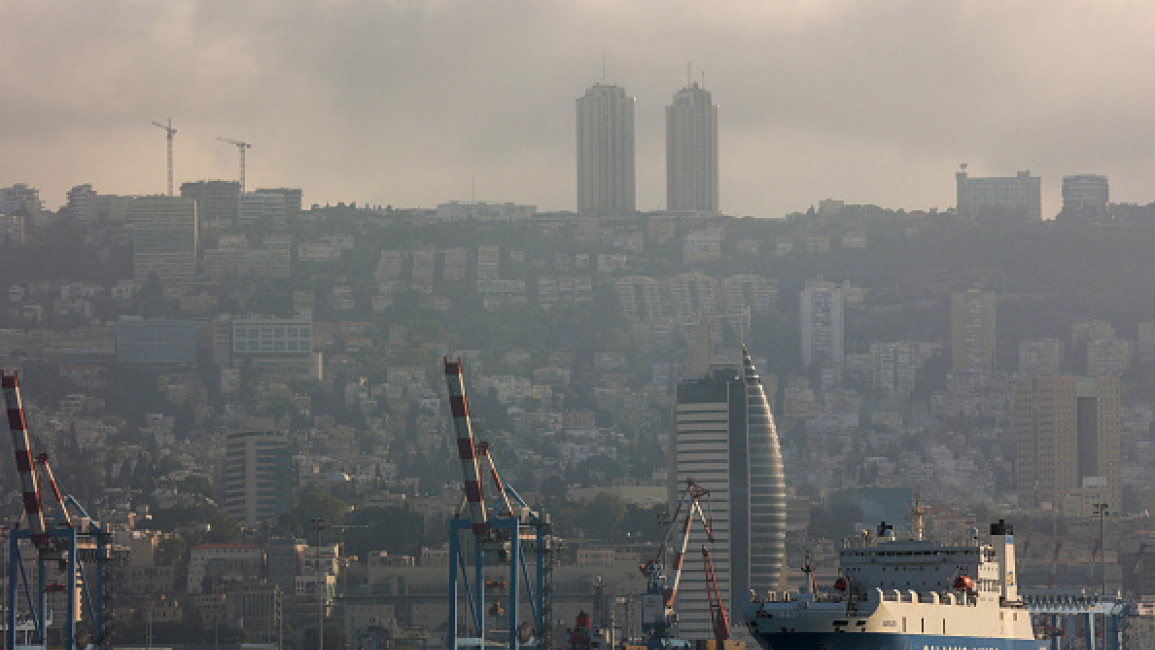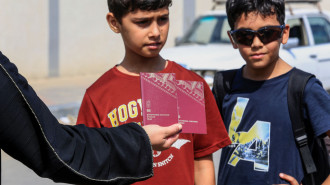Hezbollah drone collects footage of Israel's Haifa port, airport and military sites
The Lebanese Hezbollah group published footage on Tuesday of the northern Israeli port city of Haifa and its environs as tensions rapidly increase following months of border conflict between the two enemies.
Hezbollah has been engaged in cross-border fighting with the Israeli military in parallel with its ferocious war on Gaza.
Its publication of the footage drew a fiery response from Israeli officials who repeated threats of all-out war against Lebanon. It was not clear when the video was taken.
Hezbollah chief Hassan Nasrallah said last November that his group had been flying surveillance drones over Haifa and the group has also sent attack drones into Israel in the last eight months.
The drone which took the footage, dubbed by Hezbollah 'Al-Hudhud' ("hoopoe") has been celebrated by the group's supporters as a major achievement.
What did the video show?
Flying at what appears to be low altitude, the nine-and-a-half-minute long video shows the airport and Haifa port and what Hezbollah-linked media said were "important" and "sensitive" military sites. Haifa is about 27 kilometres from the Lebanese border.
The video appeared to show a military industrial zone belonging to Rafael defence where Israel assembles its air defence systems such as the Iron Dome, David's Slingshot, and rocket engine depots, according to Hezbollah.
More facilities such as power stations, petrochemical refineries, Israeli Navy and civilian infrastructure are also shown.
حزب الله رصد كل شيء.. حرفياً كل شيء. pic.twitter.com/Wo3M87boAK
— Leila Nicolas - ليلى نقولا (@lnicolasr) June 18, 2024
'Al-Hudhud' is also seen flying over neighbourhoods in Krayot, a cluster of four localities near Haifa. The video says 260,000 Israelis live in the residential area while it films moving traffic.
The video, shared widely by regional and international media, is seen as a threat to the Haifa Port – Israel’s largest and most important harbour – and a message to Israel’s ally, the US, which is leading mediated negotiations for a settlement in the cross-border conflict.
Supporters of Hezbollah shared remarks made by Hassan Nasrallah in August 2020 shortly after the Beirut Port explosion when he said his group knew more about the port of Haifa than the one in the Lebanese capital.
In that speech, four days after the massive blast which killed over 200 people and left swathes of Beirut damaged, Nasrallah swiftly shut down claims that a suspected Israeli airstrike targeted Hezbollah weapons at the port.
Hezbollah’s tactics seemingly aim to study Israel’s weaknesses in detecting drones coming from Lebanon, but also to reduce Israel's air superiority in the region.
The Lebanese militant group has downed several of Israel’s multi-million-dollar drones over south Lebanon in recent months.
'Total war'
Hours after the video was published by Hezbollah, the Israeli army said plans have been authorised for an offensive in Lebanon.
"Operational plans for an offensive in Lebanon were approved and validated" as commanders met for a situational assessment, the army said in a statement.
It came after Israeli Foreign Minister Israel Katz threatened Hezbollah's destruction in a "total war".
"In a total war, Hezbollah will be destroyed, and Lebanon will be hit hard," Katz said in a statement published by his ministry.
Since early October, Israeli officials have threatened to storm south Lebanon and annihilate Hezbollah, with some ministers calling for Beirut to be destroyed.
Hezbollah has in turn warned that any military action against Lebanon would be met with a harsh retaliation and would only halt its attacks on Israel when the Gaza war ends. Israeli critics of Prime Minister Benjamin Netanyahu and his far-right government have said any miscalculation by Tel Aviv would be disastrous for the state.
Tuesday’s developments coincided with a visit to Beirut by senior US adviser Amos Hochstein, who is leading efforts to calm tensions between Lebanon and Israel.
Hochstein had earlier visited Israel for talks with officials on Monday. He has urged for a de-escalation, as the US has said it did not wish to see a wider regional war.
More than 400 people have been killed in the Israeli airstrikes and shelling in Lebanon, over 330 of them fighters from Hezbollah and other groups.
Israel says around 20 of its soldiers have been killed, but Hezbollah believes the toll to be higher.




 Follow the Middle East's top stories in English at The New Arab on Google News
Follow the Middle East's top stories in English at The New Arab on Google News


![The US vetoed a UN Security Council (UNSC) resolution demanding a ceasefire in Gaza [Getty]](/sites/default/files/styles/image_330x185/public/2185152251.jpeg?h=7ef8ac04&itok=RpLSj2pu)